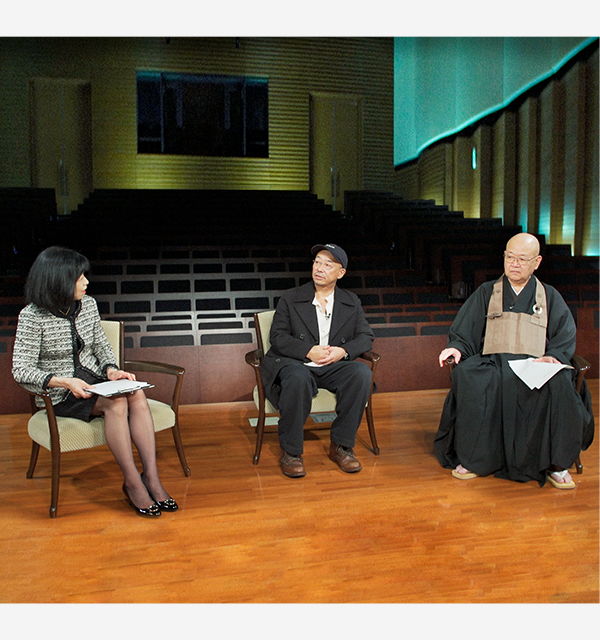
ZEN,KOMAZAWA,MOVIE
For our fourth interview we welcomed film director Tatsushi Ōmori as our guest, and together with Komazawa University Chancellor Seishi Nagai and Professor Yoko Kagami conducted a three-way discussion on the topic “Zen and Movies” centered on Mr. Ōmori’s films. An alumnus of Komazawa University Mr. Ōmori remembers feeling very blessed by his environment in his student days. While interconnecting Mr. Ōmori’s films and Zen, the discussion provoked thinking about issues related to living and dying.
* This interview was recorded during the screening of "Everyday a GoodDay" on Thursday, November 14, 2019.
From student days to the world of film
Kagami:Thank you very much for coming today.
Kagami:Mr. Ōmori, could you please introduce yourself?
Ōmori:I'm film director, Tatsushi Ōmori.
Kagami:It's a very nice to meet you.
Ōmori:I graduated from Komazawa University some years ago and now I make movies, I'm not used to interviews, but I've been looking forward to today's discussion, so thank you for having me.
Kagami:Mr. Ōmori, I understand that you graduated from the Department of Sociology, Faculty of Letters and as a student was a member of the university’s 8 mm film club, so I've very much been looking forward to speaking with you. Chancellor Nagai, could you please say a few words?
Nagai:Seishi Nagai. Thank you very much for having me today.
Nagai:I'm also a graduate of Komazawa University; I studied in the Department of Zen Buddhist Studies, Faculty of Buddhism. Around two and a half years ago I reached retirement age and left the university at that point, but through various turns of events it became necessary for me to take on the job of University Chancellor last October. However, it was this chain of events that led me to this opportunity to meet with you, Mr. Ōmori, here today, and so even though it's happenstance, I am very pleased to be able to talk with you today.
Ōmori:Likewise.
Kagami:I will be the facilitator for today's discussion. My name is Yoko Kagami; I am a professor in Komazawa University's Faculty of Global Media studies. Thank you both for joining today's discussion.
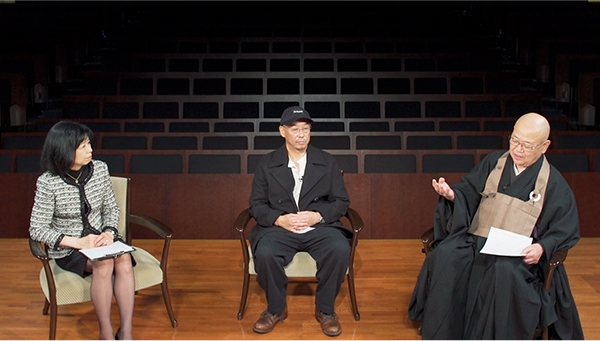
Kagami:First of all, Mr. Ōmori, please tell us some anecdotes about your student days at Komazawa University. I just mentioned that you graduated from the Faculty of Letters; is it true that one of the first things you did when you entered the university was join the 8 mm film club?
Ōmori:It is.
Kagami:Why did you decide to join this club as a first year student? And also, why did joining this club set you off on the path to your current occupation? I would very much like to hear about that.
Ōmori:That's a difficult question to answer. I entered Komazawa University after my second attempt at the entrance examination. When I was in high school, I did a bit of karate.
Ōmori:I hadn’t had much exposure to anything cultural. Also, my father performed the avantgarde ”butoh” dance, acted on the stage, and appeared in films, but when I was young I rebelled against my father, so I felt really strongly that I wanted to separate myself from those kinds of artistic activities. After entering university, that feeling suddenly dissipated. I lost all sense of what I wanted to do…During all this I would think back over things, and sometimes I would be asked to write things down, but to be honest I had no clear motive, or at least I myself have no clear idea what my motive was.
Kagami:Is that so?
Ōmori:However some of the senior students tried to get me to join the movie club in so-called "first year student recruitment".
Ōmori:I was invited to join all kinds of different clubs and societies, but
Ōmori:I couldn't work up any enthusiasm for tennis or baseball, or any of the other clubs. And so for some reason I went with the movie club.
Kagami:Moving away from sports?
Ōmori:Yes. There's a limit to the skill you can achieve in sports, don't you think?
Kagami:You played baseball before you took up karate, didn't you?
Ōmori:I did. Komazawa University is really strong in the sports area, and there are some clubs were really talented sportspeople have come together from all around the country, and I simply didn't have the skills. With regard to sports, I think there is a limit.
Kagami:I see.
Ōmori:In that sense, in a sense I went through a proper setback, and so when I eventually returned to myself, for some reason it was movies that I chose. I think my father probably influenced me, though.
Kagami:So that was the turning point in your life?
Ōmori:I did feel like I had made a turn. And then, when I entered university it was so much fun! Making movies, that is. It was also a world that I had never encountered before. When I was a kid, the only films I ever watched were action films like RAMBO and Jackie Chan movies. So the movies that the senior students taught me about were completely new to me, and initially I had no idea what they meant. But I was totally engrossed in movie-making. Inspired by the people around me as I was making my movies, university life flew by.
Kagami:You made quite a few independent film-like productions while you were at university.
Ōmori:Making, releasing.
Kagami:It was a film-lovers' club, wasn't it? A film appreciation society.
Ōmori:Making presentations.
Kagami:Well, you did have 8 mm filming equipment.
Ōmori:At that time, 8 mm film equipment was quite difficult to use. But even so, nowadays if I make everything digital, I have no idea of what I’m filming on. There’s no substance, you see. With film you are working with something that physically exists, so
Ōmori:you can say something like, "Here, this 24th frame,
Kagami:let's cut here."
Ōmori:You physically know that there are 18 frames in a second. Making movies is all about the senses.
Kagami:I see. That's a great foundation.
Ōmori:It is indeed. That's why it was a good time, and I think that I was able to have a good experience.
Kagami:And so that was the impetus for you to go into your current profession, and you've been working in the movie industry ever since, right? For today's students as well, it's possible that they could also find a job that they can do all their lives by way of their university club activities, isn't it?
Ōmori:Naturally, that's possible, but it takes quite a lot of courage. When I graduated, I never went job-hunting.
Kagami:You were still a member of the film lovers' when you graduated; what did you do after that?
Ōmori:I stayed a member.
Kagami:But you also worked as an actor for a time, didn't you?
Ōmori:Yes, I did some stage work.
Kagami:So you wanted to do this (make movies) as your profession.
Ōmori:I wanted to make moving-making my profession, but the film industry has some very difficult aspects. I grappled with it, but I must have had some unfounded confidence.
Kagami:What do you mean?
Ōmori:I never really thought that I COULDN'T do it.
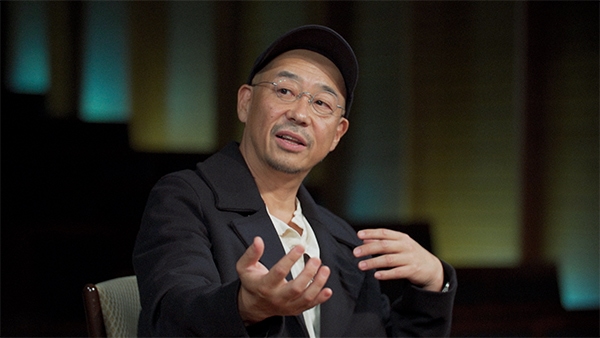
Unexpected Influence Exerted by the University Environment
Kagami:If you were to connect your time student days with your film Every Day a Good Day, I understand that you took Buddhism classes at university. Since it is compulsory for all students, regardless of their faculty, to study Buddhism-related subjects at Komazawa University,
Kagami:I'm sure you must have taken one or two religion-related subjects. Do you remember?
Ōmori:I have a vague recollection. But just walking around the campus normally there's lots of them about, aren't there? I mean Buddhist priests.
Ōmori:Including priests who are students.
Nagai:That's right.
Ōmori:There were kids with bald heads, and there were a lot of international students as well. There were kids wearing western-style clothing and kids wearing Buddhist robes. That was pretty much the day-to-day norm.
Ōmori:It was really cool.
Kagami:Really?
Ōmori:In the film club there were kids from the Faculty of Buddhism, and I heard that there were senior and junior students from the same temple. I even became friends with priests from Eihei-ji Temple.
Ōmori:Hannya Shingyo(般若心経) is written in student notebooks, isn't it?
Nagai:That's right.
Ōmori:When classes got a little boring, I would spend the entire class reading Hannya Shingyo(般若心経). I had no idea what it meant. I ended up remembering about half of it.
Nagai:Yeah, that's great.
Kagami:That's wonderful. It really is true that people absorb their environment unconsciously.
Ōmori:Today is the first day I've been at the university in a long time, and they were selling various items, and so I purchased that thing to do with the sutra.
Ōmori:I thought it might help me to empty my mind when work is busy.
Kagami:Not consciously, but rather like getting your environment in order.
Ōmori:I quite like it, actually. The only thing is, I don't have many opportunities, and so today's discussion...to be frank, I was a nervous because the University Chancellor would be here.
Nagai:No, no, the topics we'll be discussing are not so difficult.
Ōmori:But you have such a wonderful nature, you've put my nerves to rest.
Kagami:Chancellor Nagai, at the time that Mr. Ōmori was a student, you were teaching compulsory subjects to students to the Faculty of Letters, weren’t you?
Nagai:I taught in the Faculty of Law and the Faculty of Economics.
Nagai:There aren’t so many students in the Faculty of Buddhism; there are far more students in the other faculties. These days it is the information society and so I’m sure that students check and understand in advance that Komazawa University is a religious university, a Buddhist university, but when I came to the entrance ceremony in April 1965 the student next to me was in the Faculty of Economics. At first, when Hannya Shingyo(般若心経) was being read during the entrance ceremony, the student said in a loud voice, “This is a university for Buddhist monks!” I wanted to say, “Do you research properly before you get here!” Anyway, there are always lots of people like that (at Komazawa University). We on the teaching side also have a responsibility, and we need to think about how to pique the interest of people who have no knowledge of Buddhism or religion and to convey how meaningful religion, or Buddhism, is within Japanese culture. A surprisingly large number of people are interested; the question is, how do we get their feet in the door?
Kagami:Certainly. But the fact that Mr. Ōmori still remembers Hannya Shingyo(般若心経) surly shows that there he had some interest at the time, regardless of whether or not is was consciously...
Nagai:That's right. That's why when talking about Buddhism it is often said, "Even as you asleep, it enters through the pores". It's OK to sleep...Of course, that's a joke, but
Nagai:But such an expression does exist, and so people do really learn “through the atmosphere”. I also think that this is very significant. Forcefully teaching Buddhism ends up being simply teaching for the purpose of examinations. In the sense of educating humans, a degree of teaching where the learner says, “I have a vague recollection of learning this a long time ago…” is the best, I think. Accordingly, even if I personally am not studying in the Faculty of Buddhism, if just one aspect of what I vaguely remember having learned long ago can be helpful to me when am worrying over a problem at the age of 70 or 80 or perhaps younger, then I think that is the best scenario. If someone wants to become a professional, then probably they should actually shave off their hair and undergo training to be a priest.
Kagami:It's wonderful that you looked at Hannya Shingyo(般若心経) in your student notebook so attentively.
Nagai:I doubt that many students do that.
Kagami:I think your environment must have been excellent for it to remain so vividly in your memory even now.
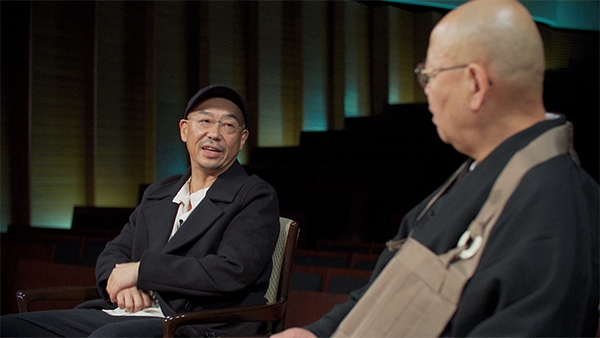
History behind Every Day a Good Day
Kagami:Here I'd like to talk about your films Every Day a Good Day and Taro the Fool.
Ōmori:Thank you.
Kagami:Every Day a Good Day. We just held a viewing, and it went exceedingly well.
Ōmori:There were quite a lot of people there, weren't there?!
Kagami:First of all, Chancellor Nagai, could you please talk a little about the conventional meaning of the phase "Every Day a Good Day" as a Zen term?
Nagai:The term itself can certainly be understood to mean a range of things. It is written somewhere that it can be interpreted as meaning “Today it rained again. Even rainy weather is good weather,” but actually I personally think that the phrase contains a murkier world. Between the end of the Tang Dynasty and the Song Dynasty, China was roughly divided into five dynasties, and the southernmost kingdom within these was Southern Han (area around present-day Guangdong Province). There was a Buddhist priest named Yúnmén Wényǎn (known in English as Unmon) who was sponsored by this kingdom. Originally from a place called Jiaxing near Shanghai, Unmon came from a prestigious background, but things did not go smoothly for him. He had an ancestor who was a great man but somewhat strange. Recruited by a friend, this ancestor went off to war without a word to his family. Then one day he remembered—junsai, makomo, suzuki-no-namasu. These are all specialty foods of Jiaxing, and Unmon’s ancestor says, “When I want to eat these foods, I’ll quit and go home.” Ultimately, he pulled out. People around him said, “Surely your honor is more important!” But he replied with something along the lines of “Temporary appetite is more important than honor.” These facts are recorded in official Chinese historical documents, so everyone knows “The Story of Unmon’s Ancestor”. People would gossip, “Did you know, he’s a descendant of that so-and-so”. So I think that Unmon’s upbringing was one in which he probably had more pressing things to think about than social success.
Nagai:Unmon initially studied under a famous Zen priest, but this teacher was extremely strict, and Unmon is said to have injured one of his legs. These were times when people would not accept you as a fully fledged priest if you had such an injury, and so that was another handicap that he bore. As he was dealing with these issues, the person who he had decided would be his teacher for life suddenly said, “I have to look after my mother, so I’m quitting the priesthood,” and quit. So what was Unmon to do now that he had no teacher who he could rely on? Next he went to Fujian Province. Although Fujian Province lay just beyond a mountain, but when Unmon arrived he found that there was already a large, flourishing temple there, and the atmosphere was not especially comfortable for outsiders. He traveled around China and ultimately settled in Guangdong Province, but as is the situation today, Cantonese sounded completely different from Mandarin Chinese, and so not only did Unmon have difficulty understanding what people were saying, but also he himself could only speak in broken Cantonese. Although he thought that the King of Southern Han probably wouldn’t understand difficult topics even if they spoke the same language, Unmon still needed to humble himself before the king as the king was his sponsor.
Ōmori:Indeed.
Nagai:Unmon experienced difficulties due to his family, when he was studying, and when he had his own monastery, and so all-in-all, I think he lived quite a difficult life. This phrase originated when Unmon said to his disciples, "If today is the fifteenth of the month, I am not asking you about the days before today. But what about after today? Give me a word about those days.” When his disciples were silent, he answered for them saying “Every Day a Good Day”. I think that what he meant when he said this is not something as simple as “The weather is fine today” but rather that “Every Day a Good Day” is something that you have to say precisely when you have all this muddiness going on.
These are times when people are suffering
Ōmori:Listening to what you said just now, what I thought was interesting was the concept of “dropping out”. A kind of drop-out, and a Buddhist priest. When I was young, economic reproduction on a large scale was still possible, but today the population is declining and, to be honest, capitalism at a standstill, wouldn’t you agree? In this situation, people today are under immense pressure to be socially successful or have tremendous ambition, and everybody is suffering because of this.
Nagai:I agree.
Kagami:So you're saying there's no answer there.
Ōmori:That's right. There's no answer. I get the feeling that people are a bit tired of the seeming logic of prioritizing the economy, but they are becoming unable to escape. Amidst all this, being able to take a breather, a teahouse perhaps, taking time for self-reflection
Kagami:entering the world of Zen from its tangible form.
Ōmori:Not only entering Zen from its tangible,
Ōmori:but also don't you think teahouses etcetera are spaces where "Life" and "death" exist somewhere separate from society? Teahouses are made almost entirely of natural materials, aren't they?
Nagai:They are.
Ōmori:The same goes for experiencing the four seasons.
Ōmori:These are actually the themes that I currently think long and hard about when planning future films.
Kagami:I see.
Ōmori:This is also actually something that we all have in common.
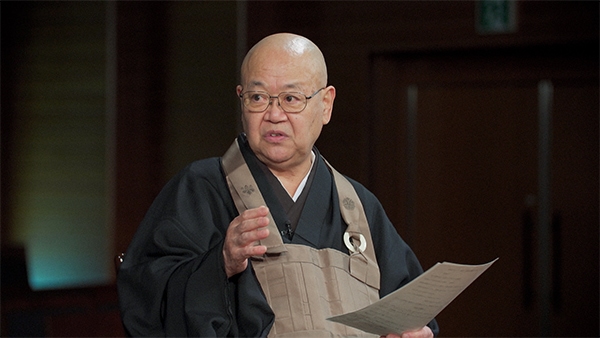
Nagai:Everyone is looking in the same direction and that’s good, or rather, it’s understandable if the trend is a positive one of upwards growth, but everyone has to look in the same direction even though currently growth is not upwards. In a sense, what I’m saying is regarded as heresy, or rather, there’s a debate in which anyone who veers away from the norm is a bit excluded, don’t you think? I’ve come back to the university, and certainly the amount of information in Tokyo is huge, young, and fairly good quality, but when I went home to the countryside I thought growing potatoes would be good, too. But I’d get scolded if I said that, so I don’t say it. We need greater acceptance of diversity. We need office worker, we need factory workers, and we need agricultural workers. I think that there is absolutely no need for everyone to have the same sense of values.
Kagami:You’re referring to “diversity management”. “Diversity”, “Inclusion”, “Management”—the Japanese terms are all loan words from English, and they are necessary terms for living with diversity. In recent years Mr. Ōmori has been making movies at a pace of one or more each year, and even there are some violent ones, there are also tranquil ones like Every Day a Good Day. I can imagine the axis that you film around, but what is the positioning of Every Day a Good Day. within your films overall?
Ōmori:That's a difficult question.
Ōmori:Fundamentally, they are all positioned the same, the way that the expression is presented changes, that's all. From my perspective, that is.
Kagami:In that case, do you have the intention of showing diversity though variety of expression? Like, "For this film, I'll go with this?"
Ōmori:Well, first of all, if it's an original work, I'll think about whether I though the story was interesting when I read it, and whether or not this is a film that I could make.
Kagami:"The film might work with this tone," and that kind of thing?
Ōmori:No, actually. When I first read a novel, or a manuscript, or an essay, I read it with much more of an open mind and see whether it can be thought of as being interesting. Then I consider what aspect of the work that I found most interesting the first time I read it. After that, I think about whether or not I have the tools necessary to transform it into a film script.
Kagami:So quite a lot of it is your initial reactions to the work.
Ōmori:The first reading is crucial.
Ōmori:If you neglect to do this, various information enters your head and people tell you lots of things. I think it’s important to hold onto your honest impressions at the beginning. After the script is written, it can take around three and four years for a movie to be released. For this reason, if you do not have something solid and strong, get pulled and pushed by other people and the movie ends up never getting made, you lose your focus. So for me, it is essential that I determine “what is important” at the very beginning of the film-making process.
Kagami:So when you read Ms. Morishita's book, on which Every Day a Good Day is based, did you think, "Let's go with this!"?
Ōmori:With this, there really was only one theme, the biggest theme was that "There are things that can be instantly understood by the general public and things that need to be slowly digested and understood over time."
Kagami:That's a wonderful theme.
Ōmori:The next thing is, “First of all create a shape and then you can insert the content.” Actually, even now, I still don’t have much sense of what “creating a shape and then inserting content” means, but I do have an extremely intense desire to know things. When I am playing a character as an actor, I generally start by “creating the character’s spirit”. However, I have a bit of a feeling that I’m running back and forth between the two methods. Spirit alone is no good. So, an active physical expression is necessary at least once. When actors move around for me, that alone raises their excitement, and they are able to open up something inside. For actors, what is really fundamentally important is the ability to free their spirts and relax. Handling actors means handling people. In these times, people are suffering quite a bit. People for whom living is difficult see this ability through actors. Something like that.
Taro the Fool: Over the 20 years since the Idea was formulated, NOTHING has changed
Kagami:For Taro the Fool, you wrote the script yourself, didn't you Mr. Ōmori ? Wasn't it the first thing you wrote in your 20s?
Ōmori:That's right.
Ōmori:That's around 25 years ago.
Kagami:And after 25 years, you are intending to launch it into the world as a new movie.
Ōmori:Initially there were opportunities to shoot the film, but a lot of different circumstances didn’t come together smoothly. While all this was happening, I was making other films. The book Taro the Fool does not translate into a movie where the story proceeds clearly, and it’s also a bit violent in places, and so it was difficult to find opportunities to shoot the film. Around that time there was the Great Hanshin Earthquake and the Aum Shinrikyo incidents, but I wrote the script before those events.
Kagami:You write the script before those things happened?
Ōmori:I was also living through that period, during the relatively sensitive time of my early 20s, and it was the first time that I felt the realization that “people really do die”. Then it was the end of the century, and then 9-11 happened, and then also 3-11 happened. Against this background, looking back I think that if Japanese people had changed how they view and interpret “death”, there would have been no need to make a movie like Taro the Fool. Things like the rationality of economics or the power to erase the smell of death—the logic of capitalism in stating that “war boosts the economy” is incredible, isn’t it? I have a feeling that humans can probably never stop [fighting wars].
Kagami:It never stops, does it?
Ōmori:No, it never does. I think that's why people join the priesthood, they have no other choice.
Nagai:These things could happen to a person even if they became a priest.
Ōmori:That's true. I personally have long held my own doubts about this. And it is the film Taro the Fool that kind of expresses these doubts as they were in their infancy.
Kagami:Even today the sentiments presented in the film are completely relatable. I think that very little has changed.
Ōmori:Yes, but even so, the timing of the movie's release is a complete coincidence.
Ōmori:The raw facts of the matter are that it became easier to find funding for Taro the Fool after so many people came to see Every Day a Good Day. But getting down to the bottom of it, the reason Taro the Fool is being filmed now is simply that I wanted to shoot a movie for which I had written the script more than 20 years ago.
Kagami:The theme hasn't changed, it's something that never changes, does it? Even over a long period of time.
Ōmori:I wonder if that is a good thing? I think that it's probably not a good thing.
Kagami:Listening to what you have just been saying, I have a feeling that something is being passed on to us from the time of the Tang Dynasty, when Unmon lived.
Nagai:I actually have a Master's degree, and I wrote my thesis when I was 24 years old. It wasn't until after I was 65 years old that the thesis was actually published as a book. It took around 40 years.
Kagami:So you were around the same age as Mr. Ōmori, maybe around 25, was when you wrote your thesis as he was when he wrote his script?
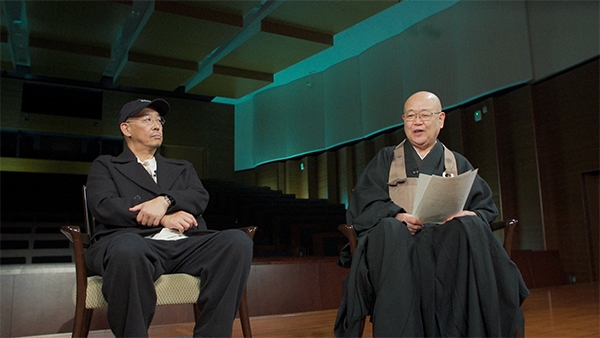
Nagai:All the while I was thinking, “Well, so what should I do?” but when you have a manuscript for so long, somewhere in your being you begin to mature. It’s a bit self-centered, but from when I was an undergraduate student we were made to read a book called Shobo Genzo (published in four volumes by Iwanami Shoten) that was written by the Zen Master Dōgen Zenji, the founder of Eihei-ji Temple. Well! I was overwhelmed by how difficult the book was to understand. I did what I was told and read it in classes. Then, after I reached a reasonable age of maturity, when I took the volumes out to read them again, I had somehow become able to understand the writing just a tiny bit. This was because the writing had been somewhere in my head all that time, going back and forth. Although there is no possibility of me suddenly arriving at Dōgen’s feeling light reaching the top of a spiral staircase, but at the very least, I gained a real understanding that I am passing through such a place.
Kagami:Since Unmon’s time, we have focusing on a theme of death, but what Mr. Ōmori experienced in his 20s, even today those events are completely fresh in my mind, so much so that I also find similar themes to be fresh. I’m not sure if I should conclude that “things haven’t changed much”, though...for either Every Day a Good Day or Taro the Fool.
Nagai:Young people are like that, though, aren’t they? Their thinking is completely different regarding social norms and other issues. Then there is the world that is irritated by these differences. If you tune these into images, you may create a world of violence like that, but it we comment without understanding this violence, we cannot determine what is actually violent and end up “shouting and screaming at the end”.
"Death" as preached by Buddha and as viewed by modern man
Kagami:Talking about the concept of death in Buddhism, It would be good if you could add a little but about Buddha.
Nagai:“Life” that humans live comprises various elements; when these elements come together life is created through their connection; death comes when this connection breaks. Also, when the balance between these connections in upset, illness and old age ensue. This is Buddha’s fundamental thinking. Accordingly, Buddha’s stance is that, “Death is merely connections disconnecting, so there is no need to be afraid.” A famous story about Buddha is the Parable of the Poisoned Arrow. Someone who I think was one of the Buddha’s disciples asked him, “What happens to humans when they die?” Buddha himself is an empiricist, and so he says, “I myself have never actually experienced death, and so I can say neither where a human goes after death, nor even whether Heaven exists of does not exist. If you are shot by a poisoned arrow, you do not ask, ‘Who shot this arrow? Why did they shoot it? What kind of poison did they use?’ If you set various conditions that must all be cleared before the arrow can be extracted, you will die.” That is to say, what he meant was, “Rather than thinking about what will happen when you die, think how you should live your life while you are alive.” Speaking in rational terms, what Buddha said was, “It’s natural for humans to die, isn’t it?” However, when humans die, it is also humans who mourn, and Buddha was also compassionate about this aspect. That is to say, there is no such thing as “Life is good, Death is bad”; in fact, we should view them both as 50-50. One problem, however, is that all this is easy to say, but for living humans matters in life rarely go smoothly; everyone suffers, and so the question becomes whether or not this conflict can be resolved.
Kagami:Yes, it's certainly difficult to explain in a few short words.
Nagai:Certainly, if you said that “‘Form is Emptiness’ in Hannya Shingyo(般若心経) over”, then it really would be the end! I think the question is how that part can be opened up and spoken about in the future. I feel especially strong about this because I am often in charge of overseeing such scenes. So when I see someone crying, I’m like poet Kenji Miyazawa—“Stand strong against the wind and rain”. Saying something like Buddha’s words telling people that if they see someone crying, they should go to the person and console them naturally has huge significance, and as a man of religion, it something that I probably need to think about.
Kagami:In that sense, I am often asked if Mr. Ōmori's latest film, Taro the Fool, is expressing views on life and death. With regard to death, in there film, there is a boy called YOSHI.
Ōmori:The actor playing the main character.
Kagami:OK, so there is Taro, the main character, and he comes out and he is questioning death. In that sense, I think that in the movie we see a view of life and death that is understood today.
Ōmori:It's difficult talking about this in front of a man of religion.
Kagami:But I could really feel it when I watched the movie.
Ōmori:I think that humans are weak animals that have to establish agreements in order to create built human society, but before humans are humans, they are individual people existing as a kind of “creature”, aren’t they? If we forget this too much, I think it conversely makes it a bit more difficult for humans to live, don’t you think? As you said, living
Ōmori:happens in the same way as dying happens, and if we forget this too much I think it conversely makes it a bit more difficult for humans to live. This is something I have believed for a long time.
Nagai:In ancient time, death was close by. People lived in large houses with extended families—grandparents, parents, and grandchildren—If the grandparents died first, then it was no good to forget too much about dying.
Kagami:There were funerals, too.
Ōmori:A "send off "given in close proximity to the deceased.
Nagai:People learned that this was what happened to everyone when they died. It doesn’t happen so often these days, but when someone died, members of their family would wipe and clean the body. The grandchildren watched all this, thereby seeing with their own eyes that this was how their kind grandfather and grandmother died, it was no trick. These days there is apparently a world in which the bodies of people who die in hospital are taken immediately to the crematorium.
Kagami:Death has become impersonal.
Nagai:Nowadays all people see is a hearse passing by occasionally and that has nothing to do with them. But I think people should think more about the fact that they, too, will die one day.
Kagami:Think realistically.
Nagai:The world of "Living life because you never know when you will die "needs to be put forward more often.
Kagami:I truly agree with that.
Nagai:I think people will probably lose the ability to be kind.
Ōmori:I really agree with that.
Kagami:Everything becomes impersonal, doesn't it?
Nagai:It is impersonal. People don't care, and at the end, when it's their turn, they scream and cry, "I don't want to die."
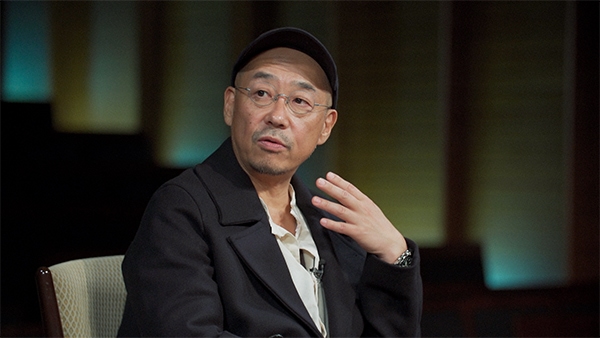
Students can still move forward making any decision about their present
Kagami:So, we are nearing the end of the discussion, and so I would like to ask Mr. Ōmori to share a message of advice for current students at Komazawa University.
Ōmori:I’ve talked about a lot, but what I would like to say to students is, “Don’t make to too many decisions on your own just yet.” That may sound harsh, but people who have truly amazing abilities in a decided field are people who no longer need to attend university. The fact that you are attending university means that you have to go back to being “no one” and reinventing yourself from there. It was the same for me—university was the starting line. I tended to think that true geniuses die when they’re 20 years old. At that time, I experienced a huge setback when I interpreted my living my life carelessly as my having comparatively little talent. Nowadays, when have become a university student, I think you should not rush so much; there is no need for you to thoroughly experience and empathize with lots and lots of things—it’s fine to just “watch and observe”. I think that you are all probably over-empathizing at the moment. In the world, you will undoubtedly have encounters with different people and things, and the important point is that you will rarely find someone or something with which can empathize. In fact, encountering people means not understanding the other person—the fundamental principal of encounters is that nobody understands the people that they meet. However, I do think that it is incredibly important for surviving in society that understand how you are perceived by these people that you encounter. When you are a film-maker, on each film you met various actors for the very first time, and you suddenly have to work closely together. This term may be strange, but in this situation, how can you “watch them properly”? If you do not ask yourself, “Can I watch then with affection?” then tremendous arguments can break out, and so this is quite an important this to do, and doing so makes it quite easy to live your everyday life, maybe with people whom you do not understand.
Kagami:There is probably no way that you will be able to gain mutual understanding straight away with people that you don't understand.
Ōmori:You won't understand each other at first. Work on mutual understanding slowly.
Kagami:You're saying that the person standing right before someone's eyes may be someone that it is difficult for the person to understand.
Ōmori:That’s right. And when you’ve become a little angry or annoyed, if you think to yourself, “This is happening because I am still small”, then that really…
Ōmori:…then I really think that [is somewhat helpful]. However, in the sense that university students are already slightly “big”, I would like you to take you time and slowly, expansively encounter your studies, and interpersonal relationships.
Kagami:Thank you very much.
Ōmori:Not at all; I apologize for getting all serious.
Nagai:No, no, you were great.
Kagami:Thank you so much for making the time today to come and talk with us.
Nagai:You shared some really excellent points.
Ōmori:Thank you.
Kagami:Chancellor Nagai, do you have a message for students?
Nagai:Exactly what you said. While it is often said that going on foolish adventures is a special right of youth, but if gain the ability to try out various different things and then dive into whatever is the best match for you, ultimately I think that you are sure to go in a good direction. Performing a job unwillingly is no fun at all, and neither is living life unwillingly. You have to find something for yourself that you can be confident of doing better than anyone else.
Kagami:I completely agree. Well then, that brings us to the end of today’s interview. Thank you both so much for joining me.
Nagai:Thank you.
Ōmori:Thank you so much.
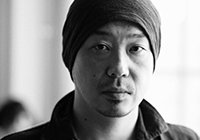 Tatsushi Ōmori
Tatsushi Ōmori
Film Director
Born in Tokyo in 1970, Tatsushi Ōmori graduated from the Department of Sociology, Faculty of Letters, Komazawa University, Japan. As a student, he was a member of the university’s 8 mm film-lover’s society, where he began making independent films.
After working as an actor and assistant director, he made his directing debut in 2005 with the film The Whispering of the Gods.
He won the 2010 Directors Guild of Japan New Directors Award for his second film, A Crowd of Three. In 2013, his film The Ravine of Goodbye won the Special Jury Prize at the 35th Moscow International Film Festival, an especially notable achievement as this was the first Japanese film to win this prize in 48 years. Together with Bozo Botchan(2013), The Ravine of Goodbye also won Mr. Ōmori the Blue Ribbon Award for Best Director, and he was awarded the 43rd Hochi Film Award for Best Director for Every Day a Good Day (2018). Having directed numerous other films that have attracted public attention—including Mahoro Ekimae Kyosokyoku (2014), Setoutsumi (2016), And Then There Was Light (2017), Haha Wo Nakushita Toki, Boku Ha Ikotsu Wo Tabetai to Omotta. (2019), and Taro the Fool (2019)—Mr. Ōmori continues to be one of the Japanese film industry’s leading directors.
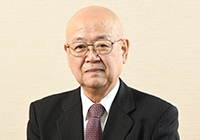 Seishi Nagai
Seishi Nagai
Chancellor of Komazawa University
Born in Gunma Prefecture in 1946, Seishi Nagai served as Dean of the Faculty of Buddhism, Komazawa University (April 2009 – March 2013) and Director of the Museum of Zen Culture and History (April 2013 – March 2017). After retiring on March 31, 2017, he was appointed as Honorary Professor of Komazawa University in June of the same year. On October 1, 2019, he was appointed as Chancellor of Komazawa University. He is the chief priest of Ryosan-ji Temple in Gunma Prefecture.
Chancellor Nagai’s field of specialty is Zen Buddhism. His main published works include the books Zen Religious Organizations and the People in China (in Japanese) (Uchiyama Shoten) and Unmon (in Japanese) (Rinsen Book Co.) and the academic paper Introduction to Research on Toko Shinetsu (various issues in Zen Buddhism)
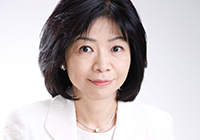 Yoko Kagami
Yoko Kagami
Professor of Komazawa University, Faculty of
Global Media Studies
Born in Tokyo Yoko Kagami, obtained a Doctor of Philosophy (Ph.D.) degree in Business Administration from International Christian University, Japan. After working for a US consulting firm, she became an assistant professor in the Faculty of Business Administration, Komazawa University. She was involved in the establishment of the university’s Faculty of Global Media Studies (GMS) as head of the preparations office and was appointed to her current position of Professor in the Faculty of Global Media Studies, Komazawa University, in 2008. She was a Visiting Scholar/Fellow at the Columbia Business School for one year in 2013-2014, and has served as Dean of the Faculty of Global Media Studies, Komazawa University (April 2015 – March 2019). In June 2019, she was appointed as Senior Advisor to the President of Komazawa University. Professor Kagami’s main published works include The Film Contents Industry and its Policies (in Japanese) (Maruzen Publishing Co., Ltd.); Study of Content (in Japanese) (Sekaishisosha-Kyogakusha Co., Ltd.); Digital Contents in a Transnational Age (in Japanese) (Keio University Press); International Tie-up Strategies in Information Communications (in Japanese) (Chuokeizai-sha); and Basics of Management Studies (in Japanese) (Chuokeizai-sha)
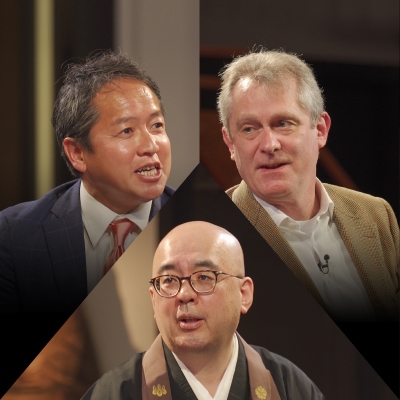
SPECIAL
ZEN,KOMAZAWA,MANAGEMENT
For our 5th discussion in this series we welcomed guest participant Mr. David Atkinson, CEO of Konishi Decorative Arts and Crafts, for a three-way dis・・・
2020.08.07
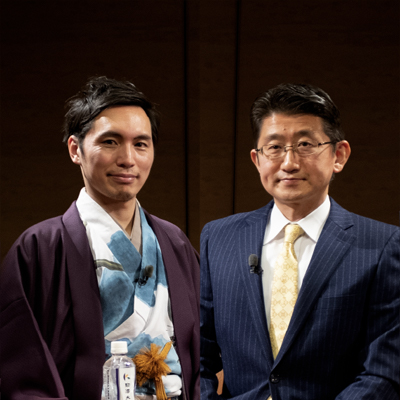
SPECIAL
ZEN, KOMAZAWA, ART
For the third interview in the series, Mr. Satoshi Anzai of the Kyoto artistic unit Daruma Shoten and Prof. Tetsufumi Muramatsu of the Faculty of Budd・・・
2019.09.17

